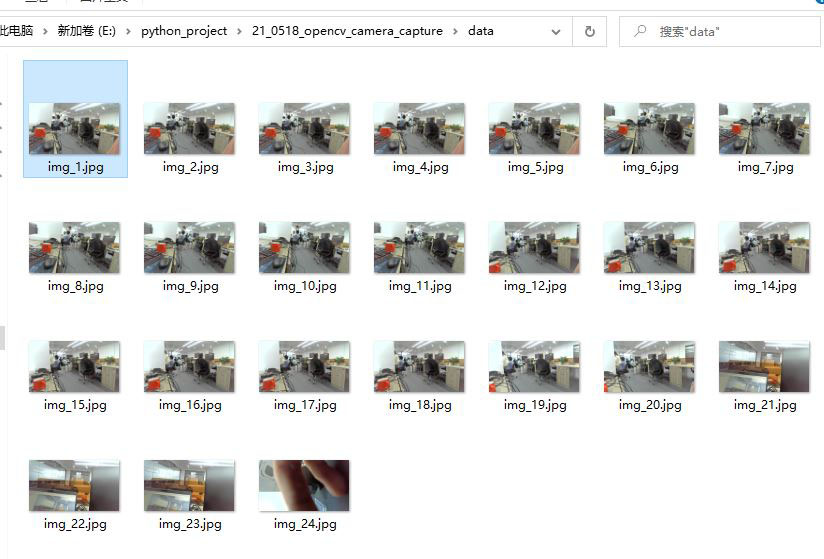对于图像采集而言,OpenCV仍然是当前相当不错的一个选择之一,接下来的这篇文章小编就来介绍一下python怎么使用OpenCV采集图片源码吧。
一、python版本
写了个python opencv的小demo,可以通过键盘按下字母s进行采集图像。
功能说明
“N” 新建文件夹 data/ 用来存储图像
“S” 开始采集图像,将采集到的图像放到 data/ 路径下
“Q” 退出窗口
python opencv源码
'''
“N” 新建文件夹 data/ 用来存储图像
"S" 开始采集图像,将采集到的图像放到 data/ 路径下
“Q” 退出窗口
'''
import numpy as np # 数据处理的库 Numpy
import cv2 # 图像处理的库 OpenCv
import os # 读写文件
import shutil # 读写文件
from PIL import Image, ImageDraw, ImageFont
# # OpenCv 调用摄像头 / Use camera
cap = cv2.VideoCapture(0)
cap.set(cv2.CAP_PROP_FRAME_WIDTH,1920)
cap.set(cv2.CAP_PROP_FRAME_HEIGHT,1080)
'''
#功能函数,只是用来往图片中显示汉字
#示例 img = cv2ImgAddText(cv2.imread('img1.jpg'), "大家好,我是片天边的云彩", 10, 65, (0, 0, 139), 20)
参数说明:
img:OpenCV图片格式的图片
text:要写入的汉字
left:字符坐标x值
top:字符坐标y值
textColor:字体颜色
:textSize:字体大小
'''
def cv2ImgAddText(img, text, left, top, textColor=(0, 255, 0), textSize=20):
if (isinstance(img, np.ndarray)): # 判断是否OpenCV图片类型
img = Image.fromarray(cv2.cvtColor(img, cv2.COLOR_BGR2RGB))
# 创建一个可以在给定图像上绘图的对象
draw = ImageDraw.Draw(img)
# 字体的格式
fontStyle = ImageFont.truetype(
"font/simsun.ttc", textSize, encoding="utf-8")
# 绘制文本
draw.text((left, top), text, textColor, font=fontStyle)
# 转换回OpenCV格式
return cv2.cvtColor(np.asarray(img), cv2.COLOR_RGB2BGR)
# 存储图像的文件夹
current_dir = ""
# 保存 图像 的路径
path_photos_from_camera = "data/"
press_n_flag = 0
cnt_ss=0
while cap.isOpened():
flag, img_rd = cap.read()
#print(img_rd.shape)
kk = cv2.waitKey(2)
# 待会要写的字体 / Font to write
font = cv2.FONT_ITALIC
# 4. 按下 'n' 新建存储人脸的文件夹 / press 'n' to create the folders for saving faces
if kk == ord('N') or kk == ord('n'):
current_dir = path_photos_from_camera
#os.makedirs(current_dir)
if os.path.isdir(current_dir):
pass
else:
os.mkdir(current_dir)
print('
')
print("新建的保存图像的文件夹 / Create folders: ", current_dir)
press_n_flag = 1 # 已经按下 'n' / have pressed 'n'
# 5. 按下 's' 保存摄像头中的图像到本地 / Press 's' to save image into local images
if kk == ord('S') or kk == ord('s'):
# 检查有没有先按'n'新建文件夹 / check if you have pressed 'n'
if press_n_flag:
cnt_ss += 1
cv2.imwrite(current_dir + "/img_" + str(cnt_ss) + ".jpg", img_rd)
print("写入本地 / Save into:", str(current_dir) + "/img_face_" + str(cnt_ss) + ".jpg")
else:
print("请在按 'S' 之前先按 'N' 来建文件夹 / Please press 'N' before 'S'")
# 添加说明 / Add some statements
#cv2.putText(img_rd, "Face Register", (20, 40), font, 1, (0, 255, 0), 1, cv2.LINE_AA)
img_rd = cv2ImgAddText(img_rd, "图片采集系统", 160, 25, (0, 255,0), 30)
#cv2.putText(img_rd, "N: Create face folder", (20, 350), font, 0.8, (0, 255, 0), 1, cv2.LINE_AA)
img_rd = cv2ImgAddText(img_rd, "N: 创建保存图像文件夹", 20, 350, (0, 255, 0), 20)
#cv2.putText(img_rd, "S: Save current face", (20, 400), font, 0.8, (0, 255, 0), 1, cv2.LINE_AA)
img_rd = cv2ImgAddText(img_rd, "S: 保存当前图片", 20, 400, (0, 255, 0), 20)
#cv2.putText(img_rd, "Q: Quit", (20, 450), font, 0.8, (0, 0, 0), 1, cv2.LINE_AA)
img_rd = cv2ImgAddText(img_rd, "Q: 退出", 20, 450, (0, 255, 0), 20)
# 6. 按下 'Q' 键退出 / Press 'q' to exit
if kk == ord('Q') or kk == ord('q'):
break
# 如果需要摄像头窗口大小可调 / Uncomment this line if you want the camera window is resizeable
cv2.namedWindow("camera", 0)
cv2.imshow("camera", img_rd)
# 释放摄像头 / Release camera and destroy all windows
cap.release()
cv2.destroyAllWindows()效果图

安装相关库
windows安装
pip install pillow
tx2/linux/…
sudo apt-get install python3-pillow
二、c语言版本
c语言源码
/*****************************************************
2021.5.18:按键采集图像
******************************************************/
#include "opencv2/core/core.hpp"
#include "opencv2/imgproc/imgproc.hpp"
#include "opencv2/calib3d/calib3d.hpp"
#include "opencv2/highgui/highgui.hpp"
#include <iostream>
#include <fstream>
using namespace cv;
using namespace std;
#define SRC_WIDTH 1920
#define SRC_HEIGHT 1080
int main()
{
//测试视频
VideoCapture capture;
capture.open(1);
//capture.open("v4l2src device=/dev/video4 ! video/x-raw,width=1920,height=1020,framerate=30/1 ! videoconvert ! appsink");
if (!capture.isOpened())
{
printf("文件打开失败");
}
capture.set(CAP_PROP_FRAME_WIDTH, SRC_WIDTH); //设置宽度
capture.set(CAP_PROP_FRAME_HEIGHT, SRC_HEIGHT); //设置长度
Mat frame;
int n = 0;
char* cstr = new char[120];
while (true)
{
capture >> frame;
if (frame.data == NULL)
{
printf("Image is empty
");
//writer.write(frame);
break;
//continue;
}
char kk=waitKey(2);
if (kk == 'S' || kk == 's')
{
sprintf(cstr, "%s%d%s", "caliberation/", n++, ".jpg");
imwrite(cstr, frame);
printf("保存了图片
");
}
namedWindow("111", 0);//参数为零,则可以自由拖动
imshow("111", frame);
waitKey(2);
}
return 0;
}效果图

到此这篇python使用opencv采集图片源码的文章就介绍到这了,更多opencv和python学习内容请搜索W3Cschool以前的文章或继续浏览下面的相关文章。

 免费AI编程助手
免费AI编程助手



